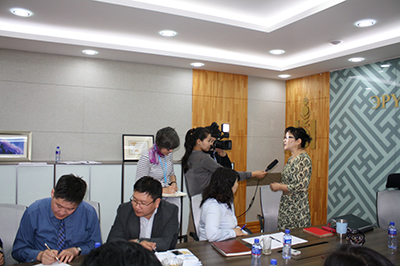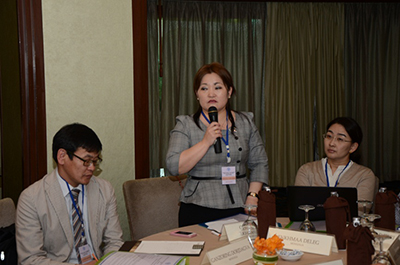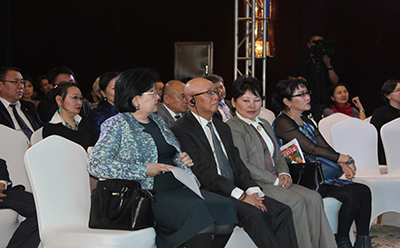Introduction
In Mongolia different ministries and agencies oversee food safety policy and strategy, food control systems, standardization, accreditation and certification. This arrangement can lead to inefficient food monitoring, limited information and delayed response.
WHO has supported national counterparts in developing national multisectoral mechanisms for effective and timely management of food safety events. Progress has been made in recent years, for example the General Agency for Specialized Inspection presently assumes a greater role in the Expanded Inter-sectoral Zoonosis Coordination Committee to ensure quality and safety across the food production chain.
Food Safety and Public Health Emergency
WHO identifies health security as a priority focus areas. Food safety is an essential component of health security. The WHO Representative Office in Mongolia has supported numerous food safety related activities under its “Emergency Response and Surveillance” programme.
WHO supported the establishment of an emergency operations centre (EOC) at the Ministry of Health and Sports to ensure preparedness for public health emergencies including food emergencies. In 2015, with WHO support emergency operations functions were expanded to the National Centre for Communicable Diseases, the National Centre for Zoonotic Diseases and the Public Health Institute through establishing emergency operations points near all three institutions. The Ministry of Health and Sports also introduced an incident management system, a standardized approach to the command, control and coordination of emergency response.
WHO continuously assists the Government in enabling a coordinated exchange of information. The National Events-based Surveillance System expanded to include monitoring and risk assessment of priority food safety incidents. The revised Foodborne Disease Surveillance and Response Guidelines of Mongolia incorporated the International Health Regulations, the International Food Safety Authority Network (INFOSAN) and other reporting mechanisms. The National Food Emergency Response Plan was developed in line with the Incidence Command System.
Intersectoral Collaboration for Food Safety
Ensuring food safety is a shared responsibility of multiple agencies including the National Security Council, National Committee on Food Safety, Ministry of Health and Sports, Ministry of Food and Agriculture, General Agency for Specialized Inspection, Public Health Institute, food business operators, civil society organizations and consumers. Hence, intersectoral cooperation at both local and national levels including timely information sharing and rapid response, are fundamental in ensuring food safety and controlling outbreaks of foodborne diseases.
WHO facilitated development of a long term strategy to strengthen national food safety. An Intersectoral Food Safety Strategic Plan for 2016–2021 was developed by a technical working group represented by key stakeholders. Once approved the Strategic Plan would serve as a guiding document coordinating activities of different players for the next 5 years.
Laboratories are an essential component of a food control system. WHO has supported the establishment of a functional food safety laboratory network in the country. A survey on food laboratory capacity mapping established a basic database for laboratory networking and developed a model for a province level coordinated surveillance, response, training, sharing of technical capacities and resources. Options and ways for food laboratory networking at provincial levels were identified.
Risk communications during food emergencies
Building national capacity to alert about potential hazards and communicate public health emergency information effectively is one of the focus areas of WHO support. In 2015, a foodborne disease outbreak response-based desktop exercise to test emergency response operations of multiple sectors and risk communications during food emergencies was organized at the EOC near the MOHS. Relevant officials from the NSC, MOHS, GASI, PHI, Institute of Veterinary Medicine, and National Centre for Communicable Diseases participated in the exercise and tested their procedures to deal with mass media involvement during food emergencies. The exercise identified that handling media and general public inquiries needs to be further improved, through clarifying roles and responsibilities of each sector and coordinating response operations.

Risk communication simulation exercise organized jointly by EOC at MOHS and WHO. Mr. Hoejskov Peter Sousa, Technical officer at Regional Office attended the exercise as an evaluator. Ulaanbaatar 22 May, 2015.
WHO closely collaborates with the Food and Agricultural Organization of the United Nations (FAO) in supporting food safety initiatives. In 2015 WHO provided a grant to technical officers from the NSC, MOHS, and GASI to attend a Regional Training on Enhancing Risk Communication for Food Safety organized by the FAO Regional Office in Bangkok, Thailand.

The Mongolian team participating in the Regional Training on Enhancing Risk Communication for Food Safety, Bangkok, Thailand, 2015.
World Health Day 2015: Increasing Public Awareness for Food Safety
Acknowledging the global burden of foodborne illnesses, global threats posed by unsafe foods, and the need for coordinated, cross-border action across the food supply chain the World Health Assembly announced food safety as the World Health Day theme for 2015 under the slogan “From Farm to Plate, Make Food Safe”.
The Government of Mongolia supported the initiative as an opportunity to increase public awareness and highlight the important role the public plays as a food safety watchdog. In close collaboration with WHO, the NSC, MOHS, MoFA and other partners produced media products including posters, short comic films, a series of comics on common malpractice in food service/production industries, an animated story about critical failures in the food supply chain, and translation of a WHO animation on five keys to safer food. An event on World Health Day, “From Farm to Plate Make Food Safe” preceded by a one-month Facebook campaign, raised awareness and advocated strategic actions. Government agencies, international donors, civil society representatives and other partners participated in the event. The advocacy materials have widely been used in food safety campaigns in 2015.

Mr. Bat-Erdene created a series of comic cartoons on food safety issues in Mongolia that were exhibited during the World Health Day event, “From Farm to Plate Make Food Safe”.

From left to right: Mrs. R.Burmaa, Minister of Food and Agriculture; Dr Soe Nyunt-U, WR WHO CO; Dr D. Atarmaa, ex-Vice Minister for Health; and Dr D.Narangerel, Technical Officer, Communicable Disease Control, MOHS at the WHD 2015 advocacy event on food safety, 7 April 2015.
